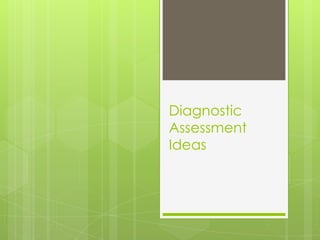
Diagnostic assessment ideas
- 2. Journal A response journal is a student’s personal record containing written, reflective responses to material he or she is reading, viewing, listening to, or discussing. The response journal can be used as an assessment tool in all subject areas http://eworkshop.on.ca/edu/pdf/Mod21_as sessment_strgs.pdf
- 3. Student Self-Assessments Self-assessment is a process by which the student gathers information about, and reflects on, his or her own learning. It is the student’s own assessment of personal progress in terms of knowledge, skills, processes, or attitudes. Self-assessment leads students to a greater awareness and understanding of themselves as learners. For diagnostic purposes students can reflect on what they know about a topic and previous experiences with this topic. This would work well with skills that are repeated and refined year after year such as comprehension strategies.
- 4. Quiz / Test Thinkingabout the criteria for success and the achievement of curriculum expectations teachers can design questions they want students to be able to answer by the end of the learning cycle. Teachers can then administer the quiz again at the end of the learning cycle to compare student results to determine student learning.
- 5. Placement Graphic Organizer Placemat Organizer is given to a group of students. Each student gets their own section on the organizer. Students write their ideas and answers in their portion of the placemat. http://bss.wcdsb.ca/literacy/Literacy%2 0Templates/Placemat%20- %20%20Square.pdf
- 6. Conference/Interview A conference is a formal or informal meeting between the teacher and a student for the purpose of exchanging information or sharing ideas. A conference might be held to explore the student’s thinking and suggest next steps; assess the student’s level of understanding of a particular concept or procedure; and review, clarify, and extend what the student has already Completed http://eworkshop.on.ca/edu/pdf/Mod21_assess ment_strgs.pdf
- 7. Poster Students can make a poster about a particular topic. Student should include a variety of pictures, headings and captions. This would be particularly helpful for a unit about media.
- 8. Performance Task During a performance task, students create, produce, perform, or present works on "real world" issues. The performance task may be used to assess a skill or proficiency, and provides useful information on the process as well as the product. http://eworkshop.on.ca/edu/pdf/Mod21_ assessment_strgs.pdf
- 9. Mind Map Students place the central topic in the center of a page. Around this topic student write one word or short phrases that relate to the main topic. Teachers can assess how much students know about a particular topic. Teachers can photocopy and return the copy to students who can add new learning to this Mind Map later
- 10. Gap Closing http://www.edugains.ca/newsite/math2/ gapclosing.html These activities are designed to uncover they typical problems students have with a specific topic. Works great in Math or could also work with grammar, or spelling.
- 11. Student Survey Students complete a survey about their ideas or understandings about a certain topic. This answers can be compared to their attitudes from the end of the learning cycle to gage student learning.
- 12. Anticipation Guides This activity activates students’ prior knowledge and builds curiosity about a new topic. Before reading, students listen to or read several statements about key concepts presented in the text; they're often structured as a series of statements with which the students can choose to agree or disagree. Anticipation guides stimulate students' interest in a topic and set a purpose for reading. http://www.readingrockets.org/strategies/antici pation_guide/
- 13. Graffiti Wall Students in a group are given a chart paper and different coloured markers. Each student with a different colour marker writes, draws, or demonstrates their understanding of a particular topic. Students write on the paper free form, all directions, and places. Teachers determine student understanding by reading each students responses.
- 14. Word Splash Students are given Key words from the unit of study prior to learning. Students are to write about their understandings of the words What the words mean What the potential topic might be How the words are related Their understandings about the words
- 15. Parallel Activity The diagnostic should be completed in conjunction with all other assessments. Teachers can design their diagnostic and their summative task to be similar. Example: Students will learn how to write a FairyTale. Diagnostic – using these characters write a short fairy tale story. Summative – Using your own characters write a Fairy Tale set in Medieval Times.
- 16. Formal Assessment UsingFormal Assessment tools DRA, CASI, PRIME, ONAP,
- 17. KWL Students are given the potential topic and a KWL chart Students answer questions about what they already know about the topic, what they want to know, and what they have already learned about the topic. http://www.eduplace. com/graphicorganizer /pdf/kwl.pdf